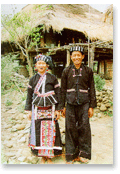Home » Lu
The Lu People

Ha Noi, Dec. 11 (VNA) — Lu is an ethnos of the Tay-Thai language group, residing largely in a number of communes of Phong Tho and Sin Ho district of Lai Chau province. A small section of this ethnic group lives mixedly with people of the Thai ethnic group in Dien Bien district of Lai Chau province and Than Uyen district of Lao Cai province. According to the 1989 statistical figures, the Lu population stands at around 3,700.
According to researchers, most of the people of this ethnos live in Chieng Mai area of Thailand, Upper Laos, Myanmar and the Sip Songpanna of Yunan, China. They think that Lu people migrated into the northwestern region of Viet Nam between the 9th and 14th centuries together with the Thai people. That the migration took place in a long period of time and from different regions and that the “Lu” have stayed scattered in a vast area in Viet Nam helps maintain the diversified customs and practices of this ethnic group.
The Lu people’s is a self-sufficing economy with wet rice farming as their main production line. Since the early days, they have known some simple farming techniques such as building canals to conduct water into their fields, rice seedling transplantation. The
cultivation of subsidiary food crops such as maize, and industrial plants such as cotton, groundnuts, cajeput… has diversified their agriculture. Such family sidelines as yarn spinning, loom weaving, tailoring, embroidery… have developed fairly strongly within the Lu community.
The Lu people often live in small hamlets, called “ban”, each embracing some 30 to 40 houses, which are made on stilts and called “huon” with two roofs and only one door facing northwest.
Like other ethnic minority groups in the northwestern region, the Lu used to live under the domination yoke of the Thai group. They had to pay tributes and do the corvee labour for the Thai rulers. Annually, each person of the Lu group had to do unpaid heavy work such as road construction, canal digging… for the local rulers for three to four months.
Formerly, the Lu society totally depended on the administrative apparatus of the Thai people. The only Lu official was the hamlet chief, called “nai ban”, who was assisted by some others. However, “nai ban” and his assistants were appointed by Thai rulers or elected by local people but approved and recognized by Thai rulers. “Nai ban” was tasked to urge local people to do the corvee labour and pay tributes to rulers, settle or adjudicate cases of violating the customary laws, property disputes and conflicts between members of the hamlet community. He was also entitled to adjudge cases of fighting, burglary, robbery, intra-lineage marriages forbidden by the customary laws. “Nai ban” and other hamlets officials used to join together through marriages in order to formulate wealthy and influential lineages governing many hamlets.
In the traditional society of the Lu people, the equality and community elements of the rural communal regime still existed and exerted their impacts on life. The hamlet’s public land was divided equally to all hamlet members who helped one another in their productive labour as well as in family affairs. Such a society was firmly built on a patriarchal institution under which the father held all powers and ran all family affairs. Property and the rights to inherit property belonged to sons only after the father passed away. Women played almost no role in social and family life.
Marriage and wedding among the Pu people have been strongly influenced by their customs and practices. After their weddings, the grooms must stay matrilocally for three to five years, or even 10 years. During their matrilocality, their fathers-in-law may prolong such duration or refuse to accept such sons-in-law.
Under their customs and practices, if a wife takes initiative in divorcing her husband, she will be fined with a buffalo; and if a husband takes initiative in divorcing his wife, he will be subject to a fine of a cow. If both sides agree to divorce, their family property shall be halved for them.
The Lu people regard the family name and given name of a person as an important factor in his/her life. The family and middle names, which indicate the gender of a person (with “ba” for the male and “y” for the female) will be kept for life without any alterations. Children bear their fathers’ family names. Yet, the given name of a person often changes after he/she goes through a serious illness or escapes from a dangerous accident. To the Lu people, such change aims to “deceive” deities so that they will refrain from punishing that person.
People of this ethnic group follow polytheims, holding that everything has a soul and human beings are surrounded by the world of deities and ghosts. They include “phi ban”, “phi muong” and “phi huon”, the supernatural forces, may affect human life. To them, the violation of their customary laws by any member of the community would hurt deities, prompting them to punish the individual violator (causing illness, unlucky things for him or her) if a minor offence is committed, or punish the entire community (by causing crop failure, epidemics, floods, droughts, earthquakes …) if a serious offence is committed. So, worships must be held to ask for forgiveness from the deities and their support to people and the community in overcoming difficulties and disasters.
The Lu people are convinced that human beings have many souls which will go on living when people die. To them, those who die a good and sound death (natural death without illness, death at old age…) will have their souls returning to the world of the dead; and those who die an evil and bad death (of an accident, death leaving bodies incomplete…) will have their souls wandering in the world of the living, causing numerous disasters to people. The funeral is organized solemnly to see the dead’s soul off to the permanent world, not letting it roaming about in the world of the living.
The Lu customs and practices prescribe the marriage in a strict manner in order to protect the health of the entire community prohibiting intra-lineal marriages. Also under such customs and practices, the private ownership of property of people is fully respected.
Generally speaking, the customs, practices and folk laws of the Lu people have been strongly influenced by those of the Thai ethnic minority group and manipulated by the Thai mandarins. However, traces of a communal regime such as equality, mutual assistance, are still found in the social, cultural as well as spiritual life of the people of this ethnic group. -Viet Nam Law & Legal Forum.

